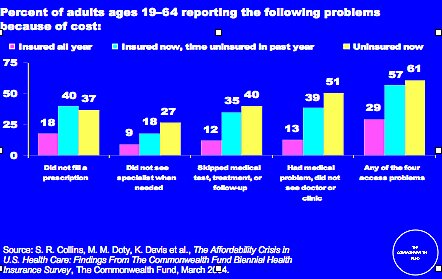In a recent post, Ezra Klein offers two arguments to beat back the “commenters hanging around demanding we redefine the word “uninsured,” attempting to downplay the problem of lack of coverage, denying all widely accepted measures of the uninsured, and, when that fails, writing the uninsured off as statistical artifacts of momentary lapses in coverage.”
Klein’s first argument is based on this chart:
According to this chart, 61 percent of those who were uninsured when surveyed reported that in the past year, they had one of the following problems:
- Did not fill a prescription
- Did not see a specialist when needed
- Skipped recommended medical test, treatment, or follow-up
- Had a medical problem but did not visit doctor or clinic
I see two problems with trying to get too much out of these data.
- The Commonwealth Fund survey asked respondents about their insurance status right now, but asked if they had to forgo medical care during the past year. With the exception of respondents who were “insured all year,” it is not clear whether care was forgone while respondents were insured or uninsured. Therefore, this survey says nothing about to what extent being uninsured caused respondents to forgo care. (To his credit, Klein acknowledges that even those with coverage forgo care. To my mind, the fact that medical care grows increasingly expensive even for those with coverage argues against reforms that would mindlessly cover the uninsured without changing the incentives faced by those with health insurance.)
- These data say nothing about the health consequences of the care forgone. Some of the uninsured suffer disastrous health consequences as a result of their lack of access to care, as Jonathan Cohn documents. But these data do not tell us how much of the reported forgone care was necessary and how much was unnecessary. So it’s a bit of a stretch to refer to these findings as “the effects of being totally uninsured.”
Klein’s second argument concerns the estimate that 45 million Americans lack health insurance. That estimate is generated by the Census Bureau’s Current Population Survey. It has been criticized for a number of reasons, which are not important for present purposes.
Klein argues that if the insurance industry uses that estimate then it must be valid. That’s because the insurance industry “isn’t prone to overhyping the millions of Americans without insurance.” Certainly the insurance industry has no interest in exaggerating the number of Americans without health insurance.
Evidently, Klein hasn’t been paying attention to the insurance industry’s political agenda, which includes massive subsidies to the insurance industry to provide health insurance to the uninsured. (Will the Left express shock when the insurance industry hijacks “universal coverage” just as it is hijacking Medicare? Consider yourselves warned.)

